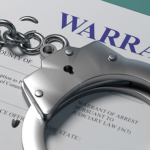In What Circumstances Can an Arrest Warrant Be Issued in NSW?

An arrest warrant empowers law enforcement officers to apprehend and take a person into custody without the officers having to separately establish the person is doing or has done something that is against the law.
There are many circumstances in which arrest warrants may be issued in New South Wales, each of which are enabled by facilitating legislation that sets down the rules for when and how a person’s liberty can so be taken away.
Here’s a rundown of the law relating to search warrants and the circumstances in which they may be issued in our state.
What is an arrest warrant?
An arrest warrant is a court order which gives the police or other law enforcement officials the power to arrest a person, before bringing them before a court.
Warrants can be issued for a variety of reasons, the most common of which is to assist in the location and apprehension of a person who has failed to attend court, in order to ensure they are then brought before the court to answer to their charges.
They may also be issued where a person has breached the conditions of their bail or a community based sentencing order such as a community correction order or intensive correction order.
The process of obtaining an arrest warrant
In most circumstances, a law enforcement officer will apply to a magistrate, judge or registrar for the issuance of an arrest warrant.
The application will need to be in the prescribed format and be supported by a document outlining the basis for the application.
The judicial decision-maker will then independently decide whether or not an arrest warrant should be issued based on the criteria set out in legislation.
After an arrest warrant is issued, it may be revoked if the magistrate, judge or registrar deem it appropriate to do so.
When can arrest warrants be issued in NSW?
The circumstances in which an arrest warrant can be issued can generally be separated into four categories:
- Warrants issued prior to conviction.
- Warrants issued after finding of guilt, conviction or committal.
- Warrants issued after sentencing.
- Other circumstances where an arrest warrant may be issued.
For each type of arrest warrant issued, there will be corresponding sections of legislation giving the magistrate, judge or registrar the power to issue that type of order.
Arrest warrants issued prior to conviction
An arrest warrant may be issued prior to someone being convicted of a crime in order to ensure that a defendant attend court to have their matter heard.
Commonly, an arrest warrant will be issued if a person fails to appear in court in a criminal matter that requires their attendance (most serious criminal charges require attendance).
The following table outlines the types of arrest warrants that are commonly issued prior to a conviction.
| Timing of warrant | Circumstances in which warrant can be issued | Power |
|---|---|---|
| For arrest before a matter comes to court | Usually when police cannot locate the suspect. Not issued by the court but by a registrar or other authorised officer. | Criminal Procedure Act 1986
|
| At or during committal | Magistrate may issue a warrant for arrest if a person fails to appear. | s 54(3A) Criminal Procedure Act |
| Before conviction in summary proceedings | Magistrate may issue a warrant for arrest if a person fails to appear. | s 181(3A) Criminal Procedure Act |
| In Apprehended Violence Order proceedings | Taking into consideration the personal safety of the protected person, magistrate or registrar of a court may issue an order to bring a defendant before the court. | s 88 Crimes (Domestic and Personal Violence) Act 2007 |
| To bring an adult to court where they are in custody but not bail refused | Magistrate or registrar of a court may issue the order if necessary to ensure appearance in court. | s 77 Crimes (Administration of Sentences) Act 1999 |
| To bring a juvenile to court where they are not bail refused | Magistrate or registrar of a court may issue the order if necessary to ensure appearance in court. | s 42 Children (Detention Centres) Act 1987 |
Arrest warrants issued after finding of guilt, conviction or committal
An arrest warrant may be issued after somebody has been found guilty of a crime or where there is a prima facie case to proceed to trial following committal proceedings.
The following table outlines the types of arrest warrants that are commonly issued after a finding of guilt, conviction or following committal proceedings.
| Timing of warrant | Circumstances in which warrant can be issued | Power |
|---|---|---|
| After finding of guilt or conviction in matters being dealt with summarily | Magistrate may issue an arrest warrant to bring the person to court for sentence if they fail to appear. | s 25(2) Crimes (Sentencing Procedure) Act 1999 |
| After committal | Warrant may be issued committing an accused to a correctional centre after committal for trial or sentence | s 109 Criminal Procedure Act |
| After suspected failure to comply with intervention program | Where the court is satisfied the person’s whereabouts are unknown, or if he or she fails to attend. | s 100R(2), (2A) Crimes (Sentencing Procedure) Act |
Arrest warrants issued after sentencing
An arrest warrant may be issued after being sentenced.
The following table outlines the types of arrest warrants that are commonly issued after sentence, including following the breach of certain sentencing conditions.
| Timing of warrant | Circumstances in which warrant can be issued | Power |
|---|---|---|
| When required to correct a sentence | Where the person does not appear or if the court is of the opinion that they will not appear | s 43(3)(a) and (b) Crimes (Sentencing Procedure) Act |
| Where there is an alleged breach of bond/suspended sentence (juvenile offenders) | Where the court is satisfied the person’s whereabouts are unknown, or if he or she fails to attend | s 41(1)(d) Children (Criminal Proceedings) Act 1987 |
| Where there is an alleged breach of a community corrections order. | Where the court is satisfied the person’s whereabouts are unknown, or if he or she fails to attend. | s 107C(2), (3) Crimes (Administration of Sentences) Act |
| Where there is an alleged breach of a conditional release order. | Where the court is satisfied the person’s whereabouts are unknown, or if he or she fails to attend. | s 108C(2), (3) Crimes (Administration of Sentences) Act |
| Whether there is an alleged breach of a community service order (juvenile offenders). | Where a person fails to attend | s 23 Children (Community Services Orders) Act 1987 |
Other circumstances where arrest warrant issued
Finally, there are a number of other discrete circumstances where a person who has not been charged with a criminal offence may be subject to an arrest warrant.
The following table outlines these ‘other circumstances’ where an arrest warrant may be issued.
| Timing of warrant | Circumstances in which warrant can be issued | Power |
|---|---|---|
| Where a witness fails to appear in response to a subpoena | Must be an application to the court, and applicant must establish “no just or reasonable excuse” for failure to comply: (see Peters v Asplund [2008] NSWSC 1061) | s 229 Criminal Procedure Act |
| In application proceedings under Local Court Act 2007, Pt 4 – where a respondent fails to appear | Where magistrate satisfied that respondent had notice of the date, time and place of the proceedings | s 65 Local Court Act 2007 |
Where a forensic/correctional patient:
|
Where the court is satisfied a credible person has shown reasonable cause to suspect a patient has either escaped or is subject to an apprehension order. | s 114 Mental Health and Cognitive Impairment Forensic Provisions Act 2020 |
Can I look up whether there is a warrant out for my arrest?
Unfortunately, there is no nationwide, or even state or territory-wide, register of outstanding arrest warrants in Australia. And a national police check will not necessarily reveal the existence of a warrant.
If you believe a warrant may have been issued by a certain court or police station, it is a good idea to call or email them to determine whether this is the case.
Alternatively, a lawyer can make enquiries on your behalf and – in the course of doing so –negotiate to protect your interests.
When can a police officer make an arrest without a warrant?
There are circumstances in which police officers in New South Wales may arrest a person without obtaining an arrest warrant.
In that regard, section 99 of the Law Enforcement (Powers and Responsibilities) Act 2002 (‘the LEPRA’) that an arrest can be made without a warrant if a police officer suspects on reasonable grounds that the person is committing or has committed an offence and if the police officer is satisfied that the arrest is reasonably necessary for any one of the following reasons:
- To ensure the appearance of the person before a court
- To prevent a continuation of the offence or the commission of another offence.
- To prevent interference with evidence.
- To prevent the fabrication of evidence.
- To preserve safety or welfare of any person; not just witnesses and including the defendant.
- To stop the person fleeing.
- To obtain property in possession of the person in connection with the offence.
- Because of the nature or seriousness of the offence.
Citizens’ arrests
There are also limited circumstances in which a citizen can make an arrest.
In that regard, section 100 of the LEPRA provides that an individual can execute an arrest if they have observed that:
- Someone is in the middle of committing an offence;
- Someone has just committed any offence; or
- Someone has committed a serious indictable offence (carrying a prison sentence of 5 years or more) and they have not yet been tried for it.
Once a person has performed a citizens’ arrest, they are required to take the arrested person and any property found on them to an ‘authorised officer‘ such as a police officer as soon as possible.
Going to court over a criminal offence?
If you are you going to court for a criminal offence, call Sydney Criminal Lawyers anytime on 9261 8881 to arrange a free first conference during which one of our experienced defence lawyers will assess your case, advise you of your options and the best way forward, and fight for the optimal outcome.






